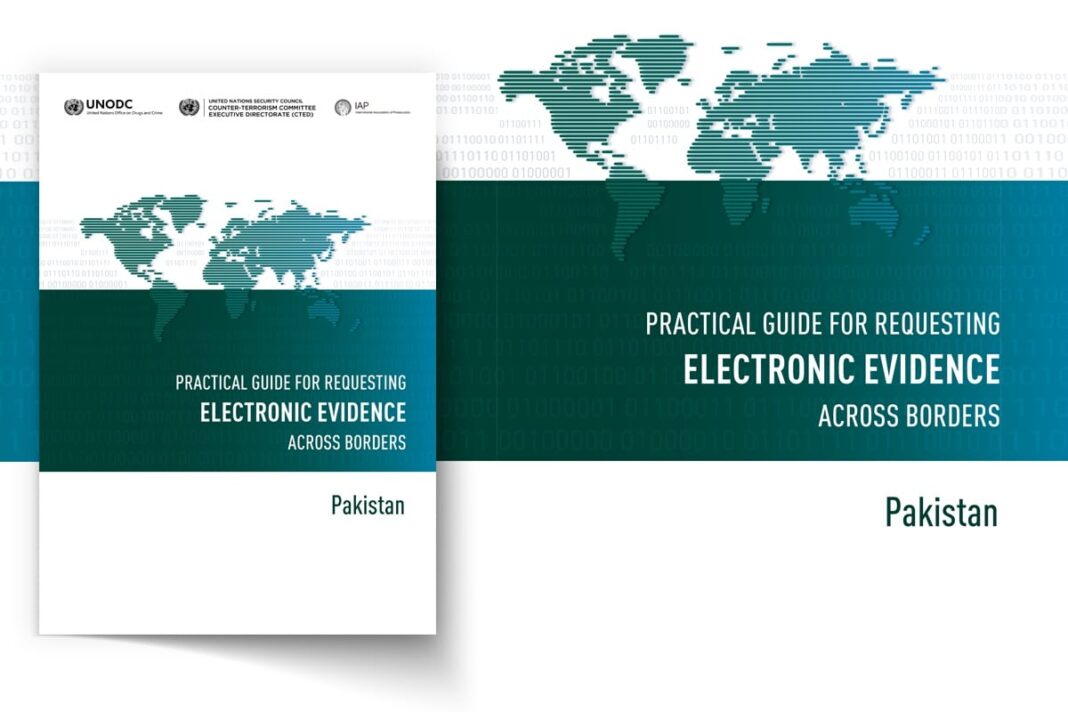Islamabad (Pakistan), 31 January 2022 – UNODC in collaboration with the Government of Pakistan launched the “Customized Practical Guide for Pakistan on Requesting Electronic Evidence Across Borders” under the framework of a European Union (EU) supported project, “Pakistan’s Action to Counter Terrorism” (PACT) at an event in Islamabad in early January.
Pakistan was the first pilot country in Asia to partner with UNODC to customize the global Practical Guide with its domestic legal framework and procedures. The Customized Guide will give law enforcement and criminal justice officials necessary tools in handling electronic evidence in terrorism related cases, with methodology and expertise focused on critical preservation, voluntary disclosure, emergency disclosure and Mutual Legal Assistance (MLA).
In his opening remarks, Asim Khan, Director General of the Counter Terrorism Division at the Ministry of Foreign Affairs, mentioned that international cooperation is a key pillar of Pakistan’s counter terrorism strategy and that with the customization of this Guide, they aim to improve the quality of requests submitted to service providers for obtaining electronic evidence, which is critical to successfully prosecute terrorism cases.
UNODC’s Global Electronic Evidence Programme coordinator Arianna Lepore briefed participants on the Global Initiative on Handling Electronic Evidence and reiterated UNODC’s commitment to provide tailored technical assistance to Pakistan. She also highlighted the growing need for establishing public-private partnerships, which will be strategically addressed with all relevant stakeholders within the Data Disclosure Framework (DDF).
Jeremy Milsom, UNODC Country Representative in Pakistan, highlighted that the number of internet users has doubled in Pakistan during the last decade, and this trend is expected to continue. In terrorism related cases, electronic evidence is consistently relevant, thus it was essential to involve all stakeholders in the country regarding the customization of the Guide. The collaboration between agencies will immensely assist investigators and prosecutors in understanding preservation, pre-mutual legal assistance, mutual legal assistance, and emergency disclosure requests.
Androulla Kaminara, Ambassador of the European Union to Pakistan, praised the accomplishments of the EU-supported project PACT Sindh in capacity strengthening of 2,500 investigators, prosecutors and judges, including 300 females, in cases related to terrorism despite Covid-19 challenges.
“At a time when internet penetration and online businesses are growing at exponential pace in Pakistan, it is vital that all such platforms remain secure from criminal activities,” Ms. Kaminara said and added that “The Electronic Evidence Guide will go a long way in securing evidence-based information against any unlawful activity online according to international regulations.”
In his closing remarks, the Foreign Secretary of Pakistan Sohail Mahmood expressed hope that the Guide would epitomize the resources available to practitioners to effectively counter transnational crime. He reiterated that the Government of Pakistan was fully aware of the ubiquitous threat posed by terrorists in the cyberspace, adding that in line with the new cyber security policy, the government remained committed to modernising and enhancing the efficiency of its systems, while improving its connectivity.
Further information
Access to the different versions of the Practical Guide, including the customized one for Pakistan, is reserved to law enforcement and judicial officials. Access is possible upon request here.
The press release from the Pakistan’s Ministry of Foreign Affairs on the subject is available here.
For more information on the work of UNODC (TPB) on electronic evidence, please visit the Sherloc Electronic Evidence Hub.









